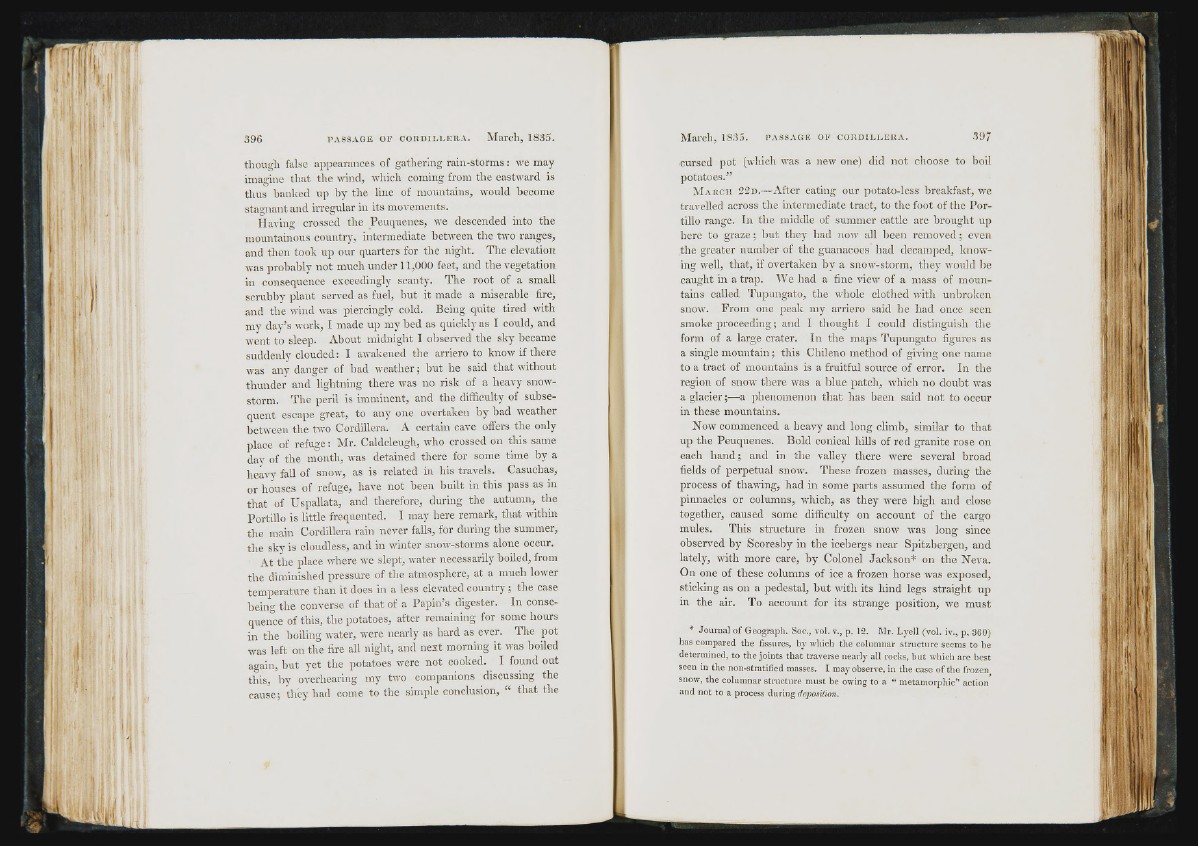
■ I f f
! ■ h *■
though false appearances of gathering rain-storms; we may
imagine that the wind, which coming from the eastward is
thus banked up by the line of mountains, would become
stagnant and irregular in its movements.
Having crossed the Peuquenes, we descended into the
mountainous country, intermediate between the two ranges,
and then took up our quarters for the night. The elevation
was probably not much under 11,000 feet, and the vegetation
in consequence exceedingly scanty. The root of a small
scrubby plant served as fuel, but it made a miserable fire,
and the wind was piercingly cold. Being quite tired with
my day’s work, I made up my bed as quickly as I could, and
went to sleep. About midnight I observed the sky became
suddenly clouded: I awakened tbe arriero to know if there
was any danger of bad weather; but he said that without
thunder and lightning there was no risk of a heavy snowstorm.
The peril is imminent, and the difficulty of subsequent
escape great, to any one overtaken by bad weather
between the two Cordillera. A certain cave offers the only
place of refuge: Mr. Caldcleugh, who crossed on this same
dav of the month, was detained there for some time by a
heavy fall of snow, as is related in his travels. Casuchas,
or houses of refuge, have not been built in this pass as in
that of Uspallata, and therefore, during the autumn, the
Portillo is little frequented. I may here remark, that within
the main Cordillera rain never falls, for during the summer,
the sky is cloudless, and in winter snow-storms alone occur.
At the place where we slept, water necessarily boiled, from
the diminished pressure of the atmosphere, at a much lower
temperature than it does in a less elevated country; the case
being the converse of that of a Papin’s digester. In consequence
of this, the potatoes, after remaining for some hours
in the boiling water, were nearly as hard as ever. The pot
was left on the fire all night, and nest morning it was boiled
again, but yet the potatoes were not cooked. I found out
this, by overhearing my two companions discussing the
cause; they had come to the simple conclusion, “ that the
cursed pot (which was a new one) did not choose to boil
potatoes.”
M a r c h 2 2 d .—xAfter eating our potato-less breakfast, we
travelled across the intermediate tract, to the foot of the Portillo
range. In the middle of summer cattle are brought up
here to graze; but they had now all been removed; even
the greater number of the guanacoes had decamped, knowing
well, that, if overtaken by a snow-storm, they would be
caught in a trap. We had a fine view of a mass of mountains
called Tupungato, the whole clotJied with unbroken
snow. From one peak my arriero said he had once, seen
smoke proceeding; and I thought I could distinguish the
form of a large crater. In the maps Tupungato figures as
a single mountain; this Chileno method of giving one name
to a tract of mountains is a fruitful source of error. In the
region of snow there was a blue patch, which no doubt was
a glacier;—a phenomenon that has been said not to occur
in these mountains.
Now commenced a heavy and long climb, similar to that
up the Peuquenes. Bold conical hills of red granite rose on
each hand; and in the valley there were several broad
fields of perpetual snow. These frozen masses, during the
process of thawing, had in some parts assumed the form of
pinnacles or columns, which, as they were high and close
together, caused some difficulty on account of the cargo
mules. This structure in frozen snow was long since
observed by Scoresby in the icebergs near Spitzbergen, and
lately, with more care, by Colonel Jackson* on the Neva.
On one of these columns of ice a frozen horse was exposed,
sticking as on a pedestal, but with its hind legs straight up
in the air. To account for its strange position, we must
* J o u rn a l o f G e o g ra p h . Soc., vol. v., p . 12. M r. L y e ll (v o l. iv., p . 3 6 0 )
h a s c om p a re d th e fissures, b y wh ich th e c o lum n a r s tr u c tu r e se em s to b e
d e te rm in e d , to th e jo in t s th a t tra v e rs e n e a rly a ll ro ck s, b u t w h ic h a r e b e s t
s e en in th e n o n - s tr a tifie d masses. I m ay observ e, in th e c a se o f th e fro z en
sn ow, th e c o lum n a r s tr u c tu r e m u s t b e owin g to a “ m e tam o rp h ic ” a c tio n
a n d n o t to a p ro ce ss d u r in g deposition.